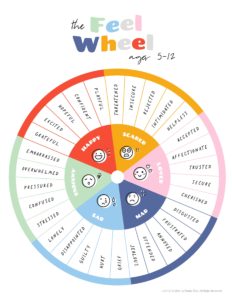I love being a mom. But Mother’s Day… Well, it’s complicated. My mom died five weeks after my wedding. I was 24 years old. For the next eight years, I found myself understandably depressed on Mother’s Day. I thought, though, that when I became a mom myself at 32, my grief would magically lift. It didn’t (and still hasn’t). Instead, it mingles with the joy I feel.
Many moms carry the weight of heartache around with us on Mother’s Day. Our reasons include the death of a child or mom, a miscarriage, a difficult path to motherhood, and broken relationships with our children or mom. If you feel depressed on Mother’s Day, embrace these 6 gentle strategies to acknowledge your complex emotions about the day, create positive memories, and experience unexpected joy with your family.
1. Recognize and acknowledge your feelings.
Try not to discount or ignore your sadness on Mother’s Day. We all experience complex and nuanced emotions. On Mother’s Day, you may feel the weight of grief and the lightness of joy all at once. Allow yourself the space to feel, and don’t judge yourself for your emotions. Show yourself the same level of kindness that you would a friend.
Also, share your feelings with your husband and kids. You’re modeling for your child how to balance
2. Set yourself up for a good day.
Focus on what feels meaningful and manageable for you. Feeling depressed on Mother’s Day may make it difficult to engage in elaborate celebrations or any celebration at all. Your typical Sunday routine may need to be tweaked. Or you may need to stay off social media and keep the TV off to avoid seeing all those Mother’s Day ads. Mom, it’s also OK to put off texting back your newly pregnant friend or even the family member checking in on you.
Give yourself permission to adjust your vision of what Mother’s Day “should” look like. Instead, embrace the freedom to manage the day in the way you need.
3. Create your own traditions.
It’s still Mother’s Day, even if you don’t eat breakfast in bed, go to brunch, or get a family photo taken. To help cope with my grief, I’ve learned to stay active on Mother’s Day. And since my primary love language is acts of service, my family of four started the tradition of yard work on Mother’s Day. The beds get new mulch, trees and bushes get trimmed, and everything gets pressure washed. My teens don’t love it, but I sure do!
4. Choose to practice gratitude.
On Mother’s Day, go on the hunt for good. While your sadness may prevent you from easily noticing the good in your life, rest assured that it’s there, even if it’s hiding in plain sight. Decide to look for it and acknowledge even the smallest things, like the sound of your child’s laughter, the softness of a blanket, or the warmth of the sun on your cheek. Research shows practicing gratitude helps women experiencing depression improve their mental health.
On Mother’s Day, you may feel the weight of grief and the lightness of joy all at once. Allow yourself the space to feel, and don’t judge yourself for your emotions. Show yourself the same level of kindness that you would a friend. Click To Tweet5. Indulge in self-care.
This is it, Mom. The one day when the whole world gives moms a guilt-free pass to indulge in self-care. Your self-care might not look like mine. And it might not include spa treatments, relaxing on the couch watching rom-coms, or eating chocolates. That’s just what the marketing folks think self-care for moms looks like. For many of us, those are our go-to ways to express our self-love language. But, when you feel depressed on Mother’s Day, you may need to approach your self-care differently.
Plan ahead of time what you want to do. Maybe it’s going on a family hike, baking cookies together, or lighting a candle and listening to your favorite music. And, hey, if it’s watching Christmas feel-good movies in May, that’s perfectly perfect. The point is to plan for and practice taking care of yourself on Mother’s Day.
6. Help another mom.
While your reasons for feeling depressed on Mother’s Day are uniquely your own, you aren’t alone in that feeling. Many women experience deep sadness on this day. “Doing nice things for people and focusing on the needs of others may actually help people with depression and anxiety feel better about themselves,” explains Dr. Jennifer Cheavens, professor of psychology at Ohio State, when talking about her research published in the Journal of Positive Psychology.
Think about your friend group, your connections on social media, or even the women you see every weekend at church or your kid’s game. You already know someone who suffered a miscarriage, lost her mom, or struggles with infertility. Reach out to her. Let her know you see her and understand her pain on Mother’s Day. Your simple act of kindness goes a long way for you both, including reducing your own feelings of sadness and loss.
What words of encouragement or advice would you give a friend who feels depressed on Mother’s Day?










